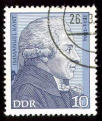Kant's philosophical system falls under the name of transcendental idealism. In the Critique of Pure Reason, Kant tries to make a science of metaphysics. Mathematics (with Thales) and Physics (with Bacon) deserve the name of science in so far as they have reached through rapid intellectual revolutions the status of investigations of the a priori elements of cognition, fulfilling the requirements of necessity, strict universality and fecundity that characterise a priori knowledge worthy of the name. (p.26, Critique of Pure Reason, Everyman edition, 1934)
"Reason must approach nature with the view, indeed of receiving information from it, not however in the character of a pupil, who listens to all that his master chooses to tell him, but in that of a judge, who compels the witnesses to reply to those questions which he himself thinks fit to propose. To this single idea must the revolution be ascribed, by which, after groping in the dark for so many centuries, natural science was at length conducted into the path of certain progress". Critique of Pure Reason, p.11.
A priori knowledge is knowledge that is absolutely independent of all experience. (p.25)
"And just in this transcendental or supersensible sphere, where experience affords us neither instruction nor guidance, lie the investigations of Reason." (p.28). Kant attempts to transform metaphysics into a science. Having thoughts is not sufficient to knowledge. Knowledge requires criticism (from Greek xrivo: judge). "Metaphysics will always exist so soon as reason awakes to the exercise of its power of speculation". He asserts that the main obstacle to metaphysics becoming a science has been the search for things in themselves prior to the establishment of the limits and tasks of the activity of cognition.
"The Critique of pure speculative reason is a treatise on the method to be followed, not a system of the science itself. But, at the same time, it marks out and defines both the external boundaries and the internal structure of this science. [...] For this result, we are indebted to a criticism which warns us of our inavoidable ignorance with regard to things in themselves, and establishes the necessary limitation of our theoretical cognition to mere phenomena."(p.15-17) Kant outlines its propedeutic function as operating similarly to the Socratic maieutic method by prooving the ignorance of its objectors. (p18)
"The critical science is opposed to dogmatism, that is to the presumption that it is possible to make any progress with a pure cognition derived from (philosophical) conceptions, according to the principles which reason has long been in the habit of employing- without first enquiring in what way and by what right reason has come into the possession of these principles. Dogmatism is thus the dogmatic procedure of pure reason without previous criticism of its own powers." (p20)
"Metaphysics deals with pure conceptions- not like mathematics with conceptions applied to intuition- and in it, reason is the pupil of itself alone." (p.12)
Kant calls his philosophy critical (because it concerns itself with judgements) and transcendental. The latter term can be seen as pointing to the two criteria asserted above for the distinction between metaphysics and dogmatism: universality and necessity. On this, Cassirer (the major exponent of Kantian philosophy after Kant) says:
"His transcendental method has to assume 'the fact of the sciences' as given, and seeks only to understand the possibility of this fact, its logical conditions and principles. But even so, Kant does not stand merely in a position of dependence on the factual stuff of knowledge, the material offered by the various sciences. Kant's basic conviction and presupposition consists rather of this: that there is a universal and essential form of knowledge, and that philosophy is called upon and qualified to discover this form and establish it with certainty. The critique of reason achieves this by reflective thought upon the function of knowledge instead of upon its content. It discovers this function in judgement, and to understand judgement in its universal and necessary structure and in its specification in different lines becomes one of the main problems of the critique." (p14-15 The problem of knowledge, Cassirer).
Transcendental refers to the conditions of intelligibility of objects, which does not belong to experience in so far as it belongs to the perceiving subject and exists a priori. It is what the subject adds to things, when knowing them. But some found at least 13 different senses in which the term is used by Kant in the first critique alone, so: Careful here that transcendental are those structures of our mind that whilst not derived from sensation/experience, would have no validity without it. Kant divides his study of the faculty of knowledge into transcendental aesthetics and transcendental logic. The latter is further divided into the Analytic and the Dialectic. Of significance, in the analytic we find his reflections on the function of the subject as cogito, in the dialectic his view on the difference between understanding and Reason.

